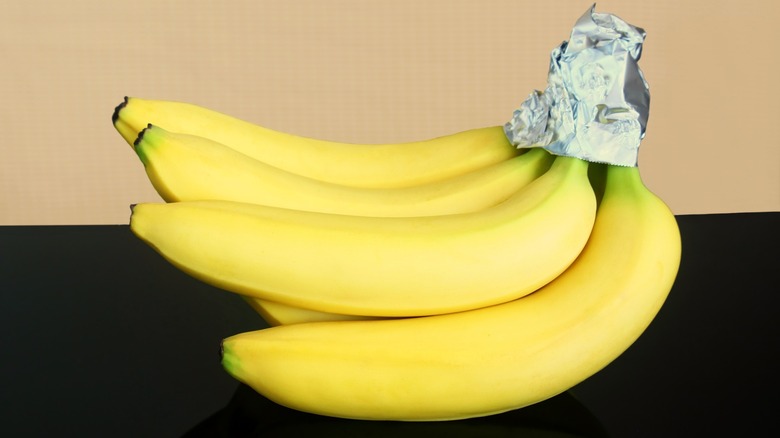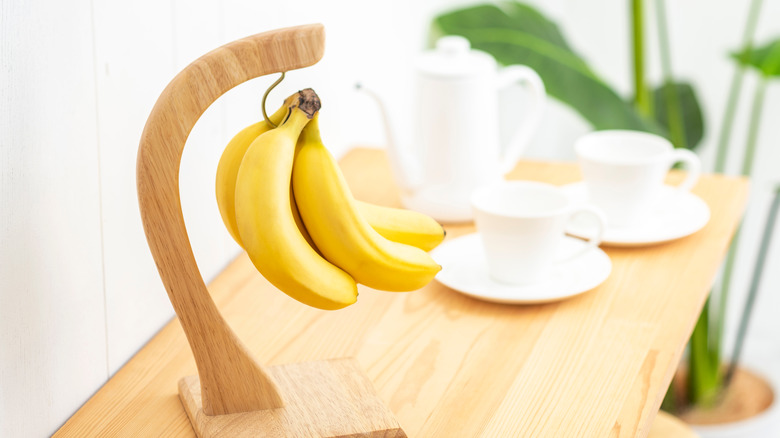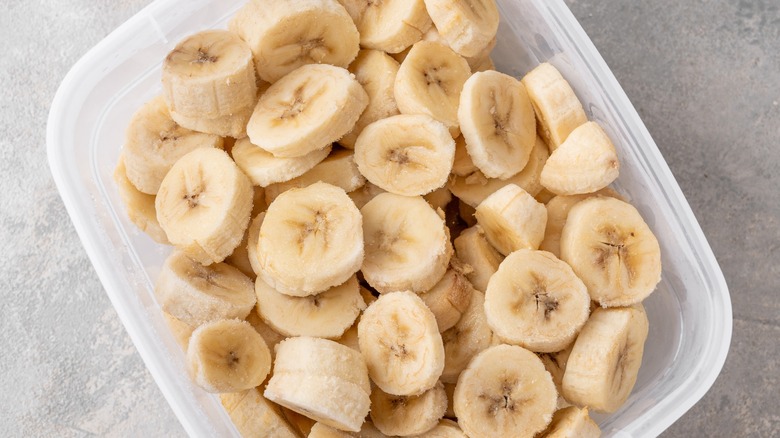The Aluminum Foil Trick That Keeps Bananas From Ripening Too Quickly
Bananas are probably one of the most difficult pieces of produce to keep fresh. These tropical fruits only take a few days to turn brown and mushy when left out on the counter, making it almost impossible to enjoy a bunch without a few going bad towards the end. Thankfully, there are many useful tricks that can prevent your bananas from ripening too fast. One of the best and easiest tricks is to wrap the stem of a banana bunch with a bit of aluminum foil.
Compared to other fruits and veggies, bananas are one of the biggest producers of ethylene gas, a natural chemical compound that promotes ripening. The majority of this gas is released through the exposed stem of the fruit, which allows a bunch of bananas to continue ripening even after it's picked from the tree. Wrapping the top of your bunch with aluminum helps to trap in some of the ethylene, so it won't escape into the atmosphere and touch the body of the bananas (or other produce you have sitting nearby, for that matter). This slows down browning and gives you more time to enjoy your bunch. Plastic wrap should also work, in case you don't have any foil around.
Hang your bananas to slow their ripening further
Bruising can also accelerate the ripening of your bananas, as any blemish spots will release ethylene and cause rapid browning. This problem grows as the fruit sits in your kitchen, since its flesh softens even more as it gets older. The fruit can even be damaged from sitting on a hard counter or table for too long.
The secret to circumventing this issue lies in hanging your bananas, which lifts them up from a hard surface and mimics the way they hang on a tree. You can invest in a dedicated fruit hanger to hold bananas, but any hook that can withstand the weight of a cluster should do the trick. You can hang your bananas in conjunction with the aluminum foil trick to slow browning even further.
One thing to be mindful of, whether you're hanging your bananas or not, is to never store them near ethylene-producing or -sensitive produce, a common food storage mistake. Carrots and leafy greens are examples of vegetables that should not be stored alongside bananas, as they will wilt at a much faster rate. Meanwhile, ethylene-producing items like apples will rot your bananas faster, and vice-versa. Try to hang bananas next to dry goods, root veggies like potatoes, or other shelf-stable ingredients that aren't ethylene-sensitive.
Other tips for storing and using bananas
Many home cooks are aware that sunlight promotes ripening in bananas, so you should try to keep this fruit in a dark, cool place. However, you should never put bananas in a paper bag in order to keep them away from the light, as this will only trap in ethylene and make them spoil faster. Placing them underneath a pantry shelf and away from a window should be more than enough to shield them from direct sunlight.
Knowing all of this, you might think to stick bananas in the fridge, but the cold temperatures can activate other hormones in the fruit that cause bruising and darkening. However, you do have the option of freezing bananas if they're close to the point of no return. You'll have to remove the peel beforehand, as it tends to brown and mush up in the freezer. You're free to slice the fruits up or leave them whole, but you should always put them in an airtight container to prevent freezer burn.
Of course, banana bread is a classic solution for using up ripe bananas, as are smoothies. You can also turn them into banana bark by mashing them, spreading them over a baking tray lined with parchment paper, and topping them with chocolate, peanut butter, and sea salt.



